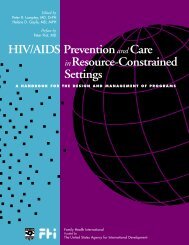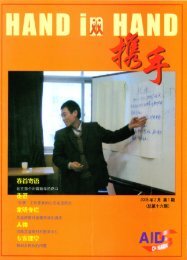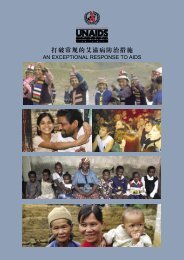The Training of Trainers Manual - UNFPA
The Training of Trainers Manual - UNFPA
The Training of Trainers Manual - UNFPA
You also want an ePaper? Increase the reach of your titles
YUMPU automatically turns print PDFs into web optimized ePapers that Google loves.
■ Respect. You must respect everyone in the group. This means there are no<br />
attacks on people, and everyone must be sensitive to other people’s points<br />
<strong>of</strong> view. Use ‘I’ statements. It is much more effective to say, ‘Well, for me<br />
personally, I feel that …’, than to say, ‘No, you’re wrong, the right thing is …’<br />
■ Attentiveness. Listen to what other people are saying. You will not only learn<br />
something but also make the people who are speaking feel more comfortable.<br />
■ Openness. To get the most out <strong>of</strong> the session, people should be encouraged to<br />
speak about their own experiences and not to speak for others. Take risks – do<br />
not be afraid to speak openly as long as you are not aggressive, abusive, or<br />
insensitive.<br />
What does safer sex mean to you (20 minutes)<br />
Divide participants into groups <strong>of</strong> about six to eight people. Each group is given a<br />
question to discuss and answer. If the audience is small, there may be fewer groups<br />
formed, and the faster groups can be given a second question to brainstorm.<br />
<strong>The</strong> peer educators spread themselves among these groups as facilitators, ideally<br />
with two or more per group, to encourage the group and help them think <strong>of</strong> more<br />
answers by giving ideas and ‘clues’.<br />
Five questions to ask in a workshop dealing with HIV/AIDS could be:<br />
■ Why do some people have sex<br />
■ What are the reasons to wait or abstain from sex<br />
■ What are some alternatives to sexual intercourse<br />
■ Why do some sexually active people not use condoms for protection<br />
■ How can we encourage someone (e.g., a partner) to act in a safer manner<br />
Guest speaker or video (30 minutes)<br />
If time allows, a guest speaker – a person living with HIV – should be invited to<br />
share his or her experience. It is best if the peer educators know the speaker well<br />
and know that she or he is a good public speaker and is well prepared. This part<br />
<strong>of</strong> the presentation is usually most effective when the speaker talks about personal<br />
experiences to which the audience might be able to relate. An emotionally<br />
engaging video about the HIV/AIDS epidemic is another way to get people<br />
motivated if a person living with HIV is not available.<br />
Break (20 minutes)<br />
130 <strong>Training</strong> <strong>of</strong> <strong>Trainers</strong> <strong>Manual</strong>

















